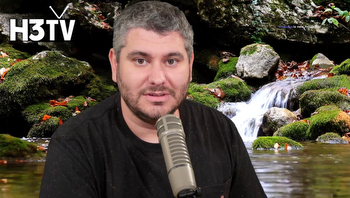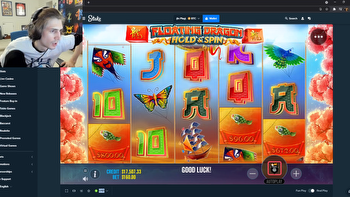Adin Ross sets bad precedents with Twitch gambling

Colors and shapes: That’s all it takes to keep a kid occupied. Throw some auditory stimuli into the mix, and you’ve got a self-sufficient machine equipped to monopolize a child’s neurons for hours. In a way, that’s exactly how I view the microcosm of video game streamers, in all their microphone-screaming grandeur. It’s not for me, and that’s okay; the populace of overzealous 20-somethings is instead embraced by an equally zealous audience of children. Therein lies the foreboding problem.
During a June 9 stream, Twitch streamer Adin Ross accidentally opened a Discord exchange in which a $2 million payment to Ross was discussed. Ross, whose connections to famous rappers turned the floodlights of popularity toward his channel, had at the time been streaming gambling games in crypto casinos, one of which being Duelbits.
Duelbits, alongside several sites of the same nature, is based offshore on the island of Curaçao where the regulations on gambling licenses are lax. Applicants are required to pay a fee, but background checks are negligent — previously approved web casinos have been fronts for money laundering and organized crime. Sites like Duelbits are not subject to legal disputes with customers or any general regulatory measures. There’s nothing withholding Duelbits from flagging users and confiscating their winnings at will or rigging their random-number generators to overturn the odds to the house.
The U.S. government cracks down on sites like Duelbits, effectively banning their service, but a powerful enough VPN can grant access to American players and prevent them from being tracked. Cryptocurrency adds another layer of protection — Duelbits accepts Ethereum, Bitcoin, Litecoin and Dogecoin, eliminating banks and credit card companies as third parties. Users might be traced by their cryptocurrency wallets, but the blockchain network ultimately offers unprecedented anonymity and control over one’s funds.
In the case of Ross, what’s happening is quite simple: He hops on live, tacks a promo code to his stream, spends a few hours betting on Duelbits’ offerings of virtual slot machines, blackjack or roulette and gets rich. Sometimes he loses money, but that means it’s all the more exciting when he wins big. Either way, Ross is paid six to seven figures a month to gamble, so what difference does it make?
On YouTube, some of his best moments are clipped and re-uploaded. The titles of these videos give away the high-stakes nature of Ross’s streams: “ADIN ROSS WINS $300,000 GAMBLING IN MEXICO,” “ADIN ROSS LOSES $100K IN 10 MINUTES!! (HILARIOUS).” Ross loses money, but he wins more frequently — at least, the videos of him winning surpass those of him losing, both in quantity and in view count.
Even without YouTube views, Ross is popular with almost 5 million followers and 34 million total views on Twitch. It takes little imagination to think of what kinds of people are watching Ross endorse casino games. The issue is that 37.9% of Twitch’s active users are between the ages 10 and 19. The math favors a fanbase of a whole lot of minors who aren’t equipped with the foresight needed to renounce the act of gambling, especially when their favorite streamer is adamant about its greatness.
In an archived Twitch stream of the H3 Podcast, YouTuber Ethan Klein hosts Ross alongside streamers Hasan Piker and Matthew Rinaudo, and the four hash out over a Zoom call. Rinaudo, known on the site as Mizkif, was also briefly involved in gambling on Twitch. Most of the conversation takes place between Klein and Ross, as the focus of the episode is the gambling controversy. When Ross is confronted with accusations that he’s doing something objectively wrong, he doesn’t hesitate to agree.
Klein inquires, “You have no problem peddling gambling to children, that’s a more soulless act than not smiling, wouldn’t you agree?”
Ross breaks into a cheeky grin before responding, “It’s fun!”
It’s easy to understand how Ross gets so caught up in the scheme. The live events are so emotionally charged that it feels like intruding — imagine a Las Vegas casino, but with a camera propped up at every machine. In one video, Ross leans forward in concentration, eyes locked on the whirring images of shiny multicolored gems. He shouts expletives at the game as if to intimidate it into improving his odds. When he scores, he grins widely. When he scores big, he claps, shouts and jumps in his seat, as zaps of adrenaline take a physical form. This is what the kids are interested in — the thrilling nature of the game, the scintillating stunt of victory.
Age is the fundamental issue — in every sense, promoting gambling to children is deeply, unequivocally wrong. To watch someone experience unprecedented peaks of euphoria upon winning a life-changing amount of money is extremely dangerous to the impressionable; these are moments that should not be broadcasted, that no child should ever see.
There’s a reason why the federal government age-restricts gambling. Children and adolescents are to gamble for entertainment, to compete with their friends or to relieve boredom, as opposed to adults who are more motivated by the advantage of a financial boost. The effects of gambling are thus exacerbated on young brains — substance abuse, interpersonal difficulties and a host of mental health problems can result. A lack of research clouds our understanding of treatment options, but if an Adin Ross fan falls victim to the grave reality of a gambling problem, Ross will hold on tighter to his earnings, with all but an impertinent smirk to offer in return.
As for Ross, he is not trying to run from being canceled, or to avoid some scandal; he accepts the allegations in a way that almost feels unexpected. He knows what he’s doing, and he knows that it’s wrong. If the circumstances were different, it would almost be unfair to expect a 20-year-old to be a knight of virtue and turn down a life-changing sum of money.
I’m 19 years old, and I just started making my own doctor’s appointments — and I mean just started. Independence is a looming shadow under the water, an unflinching fact of life that I will soon have to embrace. This is the age for opening a checking account and finding a cheap apartment, not deciding how to spend millions of dollars in excess cash. In fact, I spend almost every conscious minute distracting myself from existential confusion and thoughts about my future — it’s hard to speak for Ross because he is so alienated from the triviality of the college-aged person. If he wasn’t sitting proudly in moral purgatory, I might feel bad for Ross; maybe somewhere in there is a deeply misguided kid, blinded by millionaire tunnel vision.
The nature of digital celebrities brings about a new kind of autonomy for young stars, because the internet is not an industry in the way Hollywood is. There are less talent scouts and big studio contracts — instead, as the product, the internet celebrity governs the way they carry themself in the virtual realm with minimal guidance.
Ross accepted the money because he’s the guy in charge, even though this choice may bear detriment to his future as a successful figure. He might not be mainstream enough to attract the likes of tabloid journalism, but he is important enough to influence a large niche audience. Ross, at the age of 20, is granted this formidable power and platform, and he uses it to peddle the most harmful habit next to drugs.
While Ross is entitled to his own poor judgment, Twitch is entitled to operating a safe, accessible platform. To answer the question of “who let this happen,” we must fixate the accusatory glare on the site itself. Ross, accompanied by several others like him, operates under the rules of the website — rules that have failed to condemn online gambling as a whole. Twitch’s terms of service impose a blanket policy prohibiting illegal activity, but restrictions against gambling streams are not specifically written.
What we see on Twitch is streamable, and anything streamable is monetized. While there’s still a chance to set a precedent and wholly condemn online gambling, Twitch willfully neglects the issue; their inaction serves to convince more streamers that it’s okay to Adin Ross-ify their content.
There should be a serious incentive to act the opposite, but the website’s accommodation of gambling implies a grim future of Twitch as a destination for brand advertising and unscrupulous money-grabs, a platform on which ethics are thrown out the window.


































.jpg)



